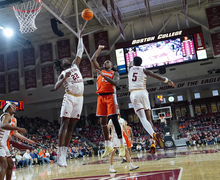How Anthony Queeley’s path to Syracuse started in the weight room
Ken Ruinard | USA TODAY Sports
Redshirt sophomore Anthony Queeley dodges Clemson defenders after a reception.
The Daily Orange is a nonprofit newsroom that receives no funding from Syracuse University. Consider donating today to support our mission.
Anthony Queeley had a clear path to the end zone. No one stepped in front of his seam route.
The then-lanky 15-year-old had perfected his catching form and constantly studied great receivers, but this time, he couldn’t convert. The ball flew above the high school sophomore’s head and into his outstretched arms, but it slipped past his fingers and fell incomplete.
Queeley turned back toward the sidelines, jogging and staring at his gloves.
“I remember telling him, ‘It ain’t your hands,’” Lake Nona head football coach Anthony Paradiso said.
Queeley emerged from that season, his first year on varsity, determined to add more muscle to earn the attention of college coaches. He turned to the weight room, joining Lake Nona’s weight lifting team and adding over 50 pounds in just two years, Paradiso said.
He transformed into a physical, consistent receiver that would bully future SEC corners such as Jarvis Ware during his senior year of high school. College offers flooded in, and he chose Syracuse, where he’s now the Orange’s second leading receiver as a redshirt sophomore. As Syraucse hosts its final home game of 2020 against NC State on Saturday, Babers said Queeley’s consistency has become a focal point for a stalling offense.
“He’s one of those guys that, when you throw the ball to him, he normally catches it,” Babers said. “You just don’t see him drop a lot of footballs, whether it’s in practice or in the games. He’s someone that you can really depend on.”
Queeley wasn’t born into an athletic family, said Kisha Queeley, his mother. Neither of his parents played sports, but Queeley joined the Central Florida YMCA at age 3 and played soccer initially. But Kisha had seen him by age 12 perfecting his catching form by watching highlights of NFL legends such as Jerry Rice. It was clear football was his future.
In flag football, Queeley knew how to make a triangle with his hands, leaving a large enough slot in the middle for the ball. At that age, most kids used the “bread basket” technique or would position their hands too wide apart, Kisha said.
By the time Queeley enrolled in Lake Nona, he’d been using the correct form for five years, allowing him to excel on the freshman team and tally over 400 yards as a sophomore. But with his weight still under 150 pounds, Queeley needed more muscle if he wanted to be recruited by colleges, Paradiso said.
“He loved going to the weight room,” Kisha said. “It really helped take his game to that Division I level.”
After his sophomore season, Queeley lifted weights six days a week. A morning workout lasted an hour and a half. An afternoon route run and catching session lasted another two and a half hours. He only took one day off.
Queeley joined all the other “high-level” athletes on the Lake Nona weight lifting team, Paradiso said. His squat reached over 300 pounds, his clean-and-jerk around 275. He was a district champion as a senior for his weight class.
“He’s one of those guys who just shows up and wants to work,” Paradiso said. “He really enjoyed his time in the weight room, and it showed.”
His weight increased from 140 pounds as a sophomore to 190 as a senior, and it paid dividends on the field. Corners couldn’t play press coverage as easily because Queeley could outmuscle most at the line of scrimmage and break into his routes, Paradiso said.
Paradiso felt comfortable putting Queeley one-on-one against the state’s best when he was a senior. When Lake Nona faced now-Missouri commit Jarvis Ware from Wekiva High School, Ware shadowed Queeley around the field, from the slot to the outside. Ware, a 6-foot-1 corner, often tried to outmuscle Queeley by jamming him on the line of scrimmage. This time, Queeley’s six-day-a-week offseason workouts paid off. Queeley didn’t budge.
“He was physically able to get off the ball and run his routes,” Paradiso said. “He won some, he lost some, but he competed.”
Published on November 25, 2020 at 5:57 pm
Contact Adam: adhillma@syr.edu | @_adamhillman






